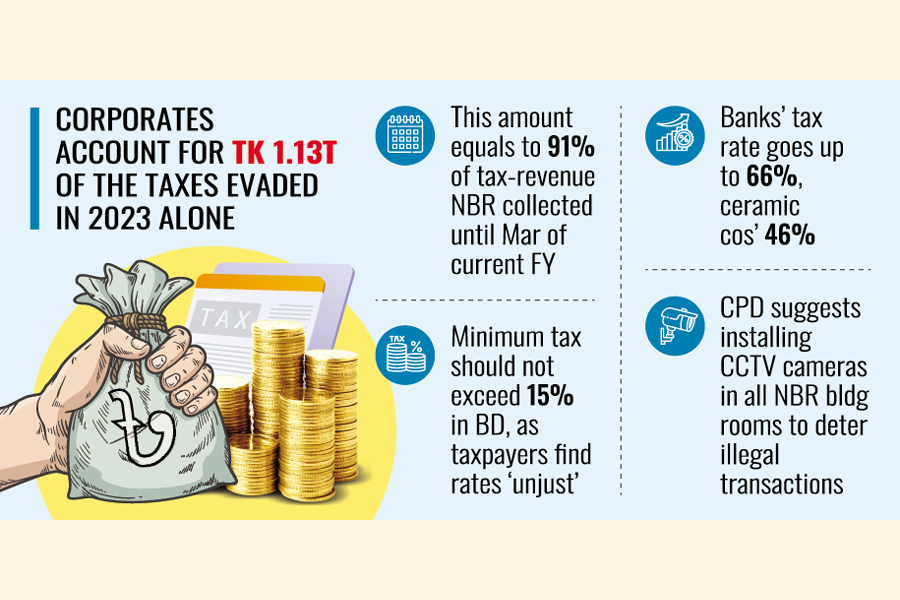
Published :
Updated :

 Tax evasion in Bangladesh surged to some Tk 2.26 trillion in a single year of 2023 that equals to a steep 91 per cent of the tax-revenue collected until March of this fiscal.
Tax evasion in Bangladesh surged to some Tk 2.26 trillion in a single year of 2023 that equals to a steep 91 per cent of the tax-revenue collected until March of this fiscal.
According to a think-tank that unveiled the latest available statistics, corporate sector led the way in evading payment of dues taxes as the business biggies accounted for an estimated Tk1.13 trillion of the total.
The tax-dodging had been on the ascent since 2011, the amount rising to approximately Tk 965 billion in 2012 and then more than doubling to Tk1.33 trillion by 2015 and Tk 2.26 trillion in 2023.
The findings on the approximate tax delinquencies were disclosed Monday at a research-outcome presentation meet of the Centre for Policy Dialogue (CPD), supported by Christian Aid.
While presenting the findings of the study titled 'Corporate Income Tax Reform for Graduating Bangladesh: the Justice Perspective', Dr Golam Moazzem, Research Director of the CPD, said checking tax evasion is the key to increasing the country's tax-to- GDP ratio which could be achieved by focusing on digitisation.
Tamim Ahmed, senior research associate of the CPD, presented the paper at the event.
Country Director of Christian Aid Bangladesh Nuzhat Jabin and Accounting professional Mohammad Zahid Hossain also spoke at the programme.
In the presentation, the CPD recommends for the government not to offer wholesale tax breaks for any sectors that currently exist for capital market and apparel exporters.
The policy think-tank recommends offering targeted tax breaks where required.
And minimum tax should not exceed 15 per cent in Bangladesh context.
They think tax bets alone cannot attract investments as there are several parameters investors consider before putting in their money.
The CPD recommends withdrawing a large part of such tax largesse as Dr Moazzem says the tax-incentives structure is "completely politically motivated".
The demands for tax exemptions, for which state exchequer incurred huge loses, were often entertained without proper assessment, he added.
"An integrated digital system for all financial transactions is needed for the government to assess how tax justice could be ensured," the economist told the function.
Mr Tamim makes a point that none of the graduated countries has such poor tax base like Bangladesh's.
"As Bangladesh is heading towards graduation, there is no alternative but to focus on increasing domestic revenue mobilisation as many of the preferential tariffs would be scrapped after graduation," he said.
Dr Moazzem notes that unjust tax incentives erode government's capacity to allocate resources for social-safety net, health and education.
He recommends legal, institutional and infrastructural reforms in tax administration to reduce income inequality.
"We want to see reflection of our study recommendations in the upcoming budget," Dr Moazzem said about the CPD standpoint.
The Centre research detected that tax officials asked for bribes from 45 per cent of corporate taxpayers in FY 2023 while 82 per cent of this category of taxpayers find the current tax rate 'unfair'.
While presenting the paper, Mr Tamim alleged that they also found the tendency of such dealing offers at the NBR while collecting data for this study.
The CPD suggests installing CCTV cameras in all rooms of tax officials at the NBR building to enhance transparency and accountability, and to deter illegal transactions.
However, it emphasises that this measure must be implemented with strict data-security protocols ensuring that only authorised personnel have access to the footage.
The surveyed taxpayers alleged that some taxmen discouraged businesses from using digital platforms for tax submissions with an intension of bribery.
Currently, only 25 per cent of the companies surveyed by CPD submit their tax returns online. The CPD survey of 123 companies, located in Dhaka and Chittagong, was conducted in December 2024.
"Tax evasion in Bangladesh is driven by high tax rates, weak enforcement, complex laws, and widespread corruption within the tax system," the policy watchdog deplores.
Some 65 per cent of the surveyed businesses reported persistent disputes with tax officials regarding the calculation of their payable tax amounts
Some 79 per cent cited lack of accountability among tax officials, 65 per cent faced disputes over tax calculation arithmetic.
Imposition of arbitrary tax assessments without proper justifications or prior communication create intangible burden, it says.
"In case of banks, effective tax rate goes up to 66 per cent while 46 per cent for ceramic companies due to such disallowances due to prevailing sense of mistrust," said Mr Tamim.
Also, surveyed business entities expressed doubts as to whether their paid tax money would be utilised in ways that benefit their businesses.
On average, a company in Bangladesh spends 5.27 per cent of its total tax paid on preparing tax return-related materials and completing the submission process.
In terms of time, the survey finds, it takes an average of 34.2 days for a company to prepare the necessary tax-related documents.
However, the maximum time taken by a company was found to be as high as 180 days, supporting stakeholders' observations that the complexity of the tax structure and preparation process contributes to significant delays.
The survey also reveals that resolving a tax dispute in Bangladesh takes an average of 93.2 days, with some cases being resolved in as little as three days and others taking up to 600 days.
Around 40 per cent of the surveyed companies reported facing problems while adjusting their tax refunds, indicating inefficiencies and delays in the refund process.
doulotakter11@gmail.com


 For all latest news, follow The Financial Express Google News channel.
For all latest news, follow The Financial Express Google News channel.